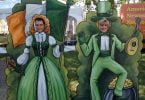
by Olivia Martin
This week I began reading a book called “The Friendship of Christ” by Robert Hugh Benson.
It was recommended to me both by a priest who lives in Denver and one of my dear friends in Kansas City.
It opens with a line from Gen 2:18: “It is not good for man to be alone.” This line acts as a lead-in to Benson’s outline of what friendship is and why it’s valuable. Benson claims friendship is “amongst the most mighty and the most mysterious of human instincts,” unexplained by motives of common interest, equal intelligence or ease of verbal expression.
Friendship does not follow the materialist’s philosophy.
Friendship does not cease when it meets disappointment or disillusionment.
For Benson, there is no reasonable explanation for friendship outside of Christ.
Friendship exists and endures precisely because God was a friend to us first. Benson says, “If . . . there is anything clear in the Gospels it is this — that Jesus Christ first and foremost desires our friendship.”
And the event that first incarnated to us the immensity of Christ’s desire to be our friend is his birth to the Virgin Mary — it’s Christmas.
In this final week of Advent, we are preparing for the birth of our best friend.
Also on my mind this year is how painful the holidays are for so many.
But what’s been made clear to me this year is that no emotion, happy or sorrowful, can diminish the reality of hope that meets us with Christmas.
Because while the coming of Christ doesn’t make our sorrows disappear, he comes to be with us in them.
The story of Christmas says that God is not distant from our sorrows.
We might not be able to answer why there’s suffering in the world, but the story of Christmas is that God, our friend, comes to stay with us in our pain and to make himself vulnerable to it.
He doesn’t let us be alone. He’s the perfect friend.
With this certainty, I pray you all experience the friendship of Christ and wish you all a very happy Christmas.






